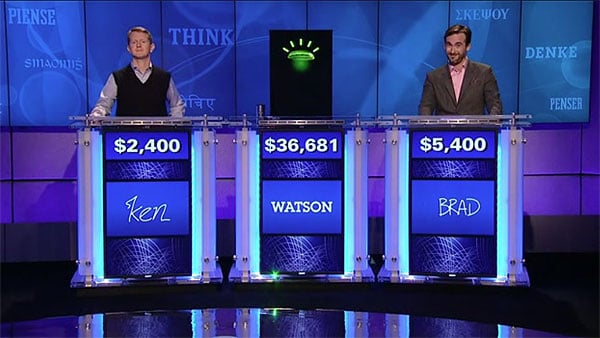In case you haven’t heard, over the course of the last few days there has been a series of Jeopardy episodes featuring Watson, an IBM computer, facing off against two of Jeopardy’s greatest players, Brad Rutter and Ken Jennings. Although on the first night it looked like the game would be close, in the end Watson was the clear winner.
There are news stories about this all over the internet (MSNBC) so I want to look, instead, at some of the questions that arise from this event. In particular, was it a fair fight and what does this mean for robotics?
Was it fair?
Looking at the comments on some of the news stories out there I have noticed many people are crying foul. The biggest complaint I have seen is that Watson receives the question electronically as a text file which some claim gives him extra time to process the question and find an answer. The alternative would be for Watson to have some sort of visual device to read the question off the screen. Personally, I don’t think it would have made much difference. The questions are all displayed in the same general area using the same size, color and font. Under these circumstances it would have been easy (easy relative to the difficulty of building Watson) for the engineers at IBM to build a vision system that could quickly and accurately read the text. However, this project was focused on a computer understanding human language and not vision.
A second issue that has come up is how Watson buzzes in. According to an article at Wired, Watson uses a mechanical button pusher along with the same button as the other players. The article doesn’t mention the speed of the button pusher but since it’s mechanical I doubt it’s significantly faster than a human finger.
The third issue I have come across is that some claim the questions were of the type that favor a computer, meaning they did not include as many puns are other intricate features of language that would be very difficult for a computer to interpret. I can’t speak for this claim since I have no idea how the questions were selected and do not watch the show often enough to know if the questions used were typical of Jeopardy.
How does this effect Robotics?
In my opinion this is the more interesting and more important of the two questions I’ve posed. However, a complete answer is way beyond the scope of this blog, or my knowledge for that matter, but I do have a few thoughts.
An important aspect of robotics is the interaction between robots and people. Typically we communicate with robots through some sort of control mechanism which could be anything from a mouse to a lever or dial. When speech is used, it usually involves relatively simple commands like “pick up the ball” or “call Katie.” These methods work but if we could communicate with computers the same way we communicate with each other then we could use computers, and thus robots, far more effectively. One application suggested by IBM is having a computer analyze a patent’s description of symptoms to help the doctor make a diagnosis.
Let me know what you think. Was the game fair? Is Watson a breakthrough in computing technology or is it just a PR stunt by IBM? What are some other applications for this technology?

I guess the fairness question is a good one, because if the future of robotics is going to be that it continues to replace humans in manufacturing and service, we should know what we're up against.
ReplyDeleteI guess I'm more interested in how people have written about this, and in the idea that computers can compete one to one with people. Do we just value knowledge in isolation? Or do we also value judgment? Does Watson signify some crossing of threshholds where computers can be seen as "smarter" than humans? These are the ethical questions that intrigue me in this case.